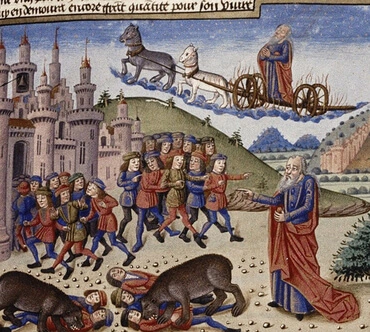1
Siden bød han den som forestod hans hus: Fyll mennenes sekker med korn så meget de kan føre, og legg enhvers penger øverst i hans sekk!
2
Men mitt beger, sølvbegeret, skal du legge øverst i den yngstes sekk sammen med pengene for hans korn. Og han gjorde som Josef bød ham.
3
Om morgenen, da det blev lyst, lot de mennene med sine asener fare.
4
Da de hadde draget ut av byen og ennu ikke var langt kommet, sa Josef til den som forestod hans hus: Ta avsted, sett efter mennene, og når du når dem, skal du si til dem: Hvorfor har I gjengjeldt godt med ondt?
5
Er det ikke det beger som min herre drikker av, og som han spår i? Dette var ille gjort av eder.
6
Og han innhentet dem og sa dette til dem.
7
Da sa de til ham: Hvorfor taler min herre således? Det være langt fra dine tjenere å gjøre noget slikt!
8
Se, de penger som vi fant øverst i våre sekker, hadde vi med oss tilbake til dig fra Kana'ans land; hvorledes skulde vi da stjele sølv eller gull fra din herres hus?
9
Den av dine tjenere som det finnes hos, han skal dø, og vi andre skal være min herres træler.
10
Og han sa: Vel, la det være som I har sagt! Den som det finnes hos, skal være min træl, men I skal være uten skyld.
11
Så skyndte de sig og løftet hver sin sekk ned på jorden, og enhver åpnet sin sekk.
12
Og han så efter; han begynte hos den eldste og endte hos den yngste, og begeret blev funnet i Benjamins sekk.
13
Da sønderrev de sine klær og lesste hver på sitt asen og vendte tilbake til byen.
14
Og Juda og hans brødre kom til Josefs hus mens han ennu var der, og de kastet sig til jorden for ham.
15
Da sa Josef til dem: Hvad er det for noget I har gjort? Visste I ikke at en mann som jeg kan spå?
16
Og Juda sa: Hvad skal vi svare min herre? Hvad skal vi si, og hvad skal vi rettferdiggjøre oss med? Gud har funnet dine tjeneres misgjerning; se, vi er min herres træler, både vi og den som begeret blev funnet hos.
17
Men han sa: Det være langt fra mig å gjøre slikt! Den mann som begeret blev funnet hos, han skal være min træl, men dra I andre i fred op til eders far!
18
Da gikk Juda frem til ham og sa: Hør mig, herre! La din tjener få tale et ord for min herres ører, og la ikke din vrede optendes mot din tjener; for du er som Farao selv.
19
Min herre spurte sine tjenere: Har I far eller bror?
20
Da sa vi til min herre: Vi har en gammel far, og han har en ung sønn, som er født i hans alderdom; hans bror er død, og han er alene igjen efter sin mor, og hans far har ham så kjær.
21
Og du sa til dine tjenere: Før ham ned til mig, så jeg kan få se ham med mine egne øine!
22
Da sa vi til min herre: Gutten kan ikke forlate sin far; for hvis han forlater sin far, da vil hans far dø.
23
Men du sa til dine tjenere: Dersom ikke eders yngste bror kommer ned med eder, skal I ikke mere komme for mine øine.
24
Da vi så kom hjem til din tjener min far, fortalte vi ham hvad min herre hadde sagt
25
Og vår far sa: dra avsted igjen og kjøp litt korn til oss!
26
Da sa vi: Vi kan ikke dra ned, men dersom vår yngste bror er med oss, da vil vi dra ned; for vi kan ikke komme mannen for øie uten at vår yngste bror er med.
27
Men din tjener min far sa til - oss: I vet at min hustru fødte mig to sønner,
28
og den ene gikk bort fra mig, og jeg sa: han er visselig revet ihjel; og jeg har aldri sett ham siden.
29
Tar I nu også denne fra mig, og det møter ham nogen ulykke, så sender I mine grå hår med sorg ned i dødsriket.
30
Skal jeg nu komme hjem til din tjener min far, og gutten, som han henger ved med hele sin sjel, ikke er med oss,
31
så blir det hans død med det samme han ser at gutten ikke er med, og vi må sende din tjener vår fars grå hår med sorg ned i dødsriket.
32
For din tjener tok på sig å svare for gutten hos min far og sa: dersom jeg ikke har ham med tilbake til dig, vil jeg være min fars skyldner alle mine dager.
33
La derfor din tjener bli i guttens sted som træl hos min herre, men la gutten dra hjem med sine brødre!
34
For hvorledes skulde jeg dra hjem til min far uten at gutten var med mig? Jeg kunde ikke se på den sorg som vilde komme over min far.







